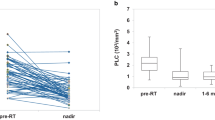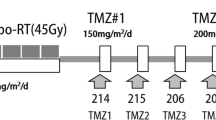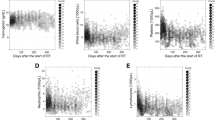Abstract
Management of patients with glioblastoma (GBM) often includes radiation (RT) and temozolomide (TMZ). The association between severe treatment-related lymphopenia (TRL) after the standard chemoradiation and reduced survival has been reported in GBM patients with the median age of 57. Similar findings were described in patients with head and neck, non-small cell lung, and pancreatic cancers. This retrospective study is designed to evaluate whether elderly GBM patients (age ≥65) develop similar TRL after RT/TMZ and whether such TRL is associated with decreased survival. Serial total lymphocyte counts (TLC) were retrospectively reviewed in patients (age ≥65) with newly diagnosed GBM undergoing RT/TMZ and associated with treatment outcomes. Seventy-two patients were eligible: median KPS 70, median age 71 years (range 65–86) with 56 % of patients >70 years, 53 % female, 31 % received RT ≤45 Gy. Baseline median TLC was 1100 cells/mm3 which fell by 41 % to 650 cells/mm3 2 months after initiating RT/TMZ (p < 0.0001). Patients with TLC <500 cells/mm3 at 2 months had a shorter survival than those with higher TLCs with a median overall survival of 4.6 versus 11.6 months, respectively. Multivariate analysis revealed a significant association between TRL and survival (HR 2.76, 95 % CI 1.30–5.86, p = 0.008). Treatment-related lymphopenia is frequent, severe, and an independent predictor for survival in elderly patients with GBM. These findings add to the body of evidence that immunosuppression induced by chemoradiation is associated with inferior clinical outcomes. Prospective studies are needed to confirm these findings suggesting that immune preservation is important in this cancer.


Similar content being viewed by others
References
Mellman I, Coukos G, Dranoff G (2011) Cancer immunotherapy comes of age. Nature 480:480–489
Ku GY, Yuan J, Page DB et al (2010) Single-institution experience with ipilimumab in advanced melanoma patients in the compassionate use setting: lymphocyte count after 2 doses correlates with survival. Cancer 116:1767–1775
Kantoff PW, Higano CS, Shore ND et al (2010) Sipuleucel-T immunotherapy for castration resistant prostate cancer. N Engl J Med 363:411–422
Huber ML, Haynes L, Parker C et al (2012) Interdisciplinary critique of sipuleucel-T as immunotherapy in castration-resistant prostate cancer. J Natl Cancer Inst 104:273–279
Lissoni P, Brivio F, Fumagalli L et al (2004) Efficacy of cancer chemotherapy in relation to the pretreatment number of lymphocytes in patients with metastatic solid tumors. Int J Biol Markers 19:135–140
Ray-Coquard I, Cropet C, Van Glabbeke M et al (2009) Lymphopenia as a prognostic factor for overall survival in advanced carcinomas, sarcomas, and lymphomas. Cancer Res 69:5383–5391
Hiraoka K, Miyamoto M, Cho Y et al (2006) Concurrent infiltration by CD8 + T cells and CD4 + T cells is a favourable prognostic factor in non-small-cell lung carcinoma. Br J Cancer 94:275–280
Lohr J, Ratliff T, Huppertz A et al (2011) Effector T-cell infiltration positively impacts survival of glioblastoma patients and is impaired by tumor-derived TGF-beta. Clin Cancer Res 17:4296–4308
Dahlin AM, Henriksson ML, Van Guelpen B et al (2011) Colorectal cancer prognosis depends on T-cell infiltration and molecular characteristics of the tumor. Mod Pathol 24:671–682
Swann JB, Smyth MJ (2007) Immune surveillance of tumors. J Clin Invest 117:1137–1146
Grossman SA, Ye X, Lesser G et al (2011) Immunosuppression in patients with high-grade gliomas treated with radiation and temozolomide. Clin Cancer Res 17:5473–5480
Balmanoukian A, Ye X, Herman J et al (2012) The association between treatment-related lymphopenia and survival in newly diagnosed patients with resected adenocarcinoma of the pancreas. Cancer Invest 30:571–576
Campian JL, Ye X, Brock M et al (2013) Treatment-related lymphopenia in patients with stage III non-small cell lung cancer. Cancer Invest 31:183–188
Wild AT, Ye X, Ellsworth S et al (2015) The association between chemoradiation-related lymphopenia and clinical outcomes in patients with locally advanced pancreatic adenocarcinoma. Am J Clin Oncol 38(3):259–265
Campian JL, Ye X, Sarai G et al (2014) The association between severe treatment-related lymphopenia and progression free survival in patients with newly diagnosed squamous cell head and neck cancer. Head Neck 36:1747–1753
Campian JL, Ye X, Gladstone DE et al (2015) Pre-radiation lymphocyte harvesting and post-radiation reinfusion in patients with newly diagnosed high grade gliomas. J Neurooncol 124(2):307–316
Grossman SA, Ellsworth S, Campian J et al (2015) Survival in patients with severe lymphopenia following treatment with radiation and chemotherapy for newly diagnosed solid tumors. J Natl Compr Cancer Netw 13(10):1225–1231
Yovino S, Kleinberg L, Grossman SA et al (2013) The etiology of treatment-related lymphopenia in patients with malignant gliomas: modeling radiation dose to circulating lymphocytes explains clinical observations and suggests methods of modifying the impact of radiation on immune cells. Cancer Invest 31:140–144
Huang J, DeWees TA, Badiyan SN et al (2015) Clinical and dosimetric predictors of acute severe lymphopenia during radiation therapy and concurrent temozolomide for high-grade glioma. Int J Radiat Oncol Biol Phys 92(5):1000–1007
Stupp R, Mason WP, van den Bent MJ, European Organisation for Research and Treatment of Cancer Brain Tumor and Radiotherapy Groups, National Cancer Institute of Canada Clinical Trials Group (2005) Radiotherapy plus concomitant and adjuvant temozolomide for glioblastoma. N Engl J Med 352(10):987–996
Malmstrom A, Gronberg BH, Marosi C et al (2012) Temozolomide versus standard 6-week radiotherapy versus hypofractionated radiotherapy in patients older than 60 years with glioblastoma: the Nordic randomised, phase 3 trial. Lancet Oncol 13(9):916–926
Dennis MS, Nicolson A, Lehmann AB et al (1998) Clinical associations of lymphopenia in elderly persons admitted to acute medical and psychiatric wards. Gerontology 44(3):168–171
Numeroso F, Barilli AL, Delsignore R (2008) Prevalence and significance of hypoalbuminemia in an internal medicine department. Eur J Intern Med 19(8):587–591
Roa W, Brasher PM, Bauman G et al (2004) Abbreviated course of radiation therapy in older patients with glioblastoma multiforme: a prospective randomized clinical trial. J Clin Oncol 22(9):1583–1588
Cao JQ, Fisher BJ, Bauman GS et al (2012) Hypofractionated radiotherapy with or without concurrent temozolomide in elderly patients with glioblastoma multiforme: a review of ten-year single institutional experience. J Neurooncol 107(2):395–405
Minniti G, Salvati M, Arcella A et al (2011) Correlation between O6-methylguanine-DNA methyltransferase and survival in elderly patients with glioblastoma treated with radiotherapy plus concomitant and adjuvant temozolomide. J Neurooncol 102(2):311–316
Babu R, Komisarow JM, Agarwal VJ et al (2015) Glioblastoma in the elderly: the effect of aggressive and modern therapies on survival. J Neurosurg 9:1–10
Funding
This study was supported by National Cancer Institute K12 Paul Calabresi Career Development Award for Clinical Oncology Program.
Author information
Authors and Affiliations
Corresponding author
Ethics declarations
Conflict of Interest
None.
Rights and permissions
About this article
Cite this article
Mendez, J.S., Govindan, A., Leong, J. et al. Association between treatment-related lymphopenia and overall survival in elderly patients with newly diagnosed glioblastoma. J Neurooncol 127, 329–335 (2016). https://doi.org/10.1007/s11060-015-2037-1
Received:
Accepted:
Published:
Issue Date:
DOI: https://doi.org/10.1007/s11060-015-2037-1




